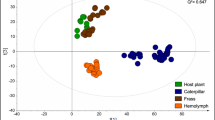Abstract
Secondary plant chemistry mediates a variety of communication signals among species, playing a fundamental role in the evolutionary diversification of communities and ecosystems. Herein, we explored diet-mediated host plant effects on development and immune response of a generalist insect herbivore. Vanessa cardui (Nymphalidae) caterpillars were reared on leaves of three host plants that vary in secondary metabolites, Plantago lanceolata (Plantaginaceae), Taraxacum officinale (Asteraceae) and Tithonia diversifolia (Asteraceae). Insect development was evaluated by larval and pupal viabilities, survivorship, and development rate. Immune response was measured as phenoloxidase (PO) activity. Additionally, chemical profiles of the host plants were obtained by liquid chromatograph-mass spectrometry (LC–MS) and the discriminant metabolites were determined using a metabolomic approach. Caterpillars reared on P. lanceolata exhibited the highest larval and pupal viabilities, as well as PO activity, and P. lanceolata leaves were chemically characterized by the presence of iridoid glycosides, phenylpropanoids and flavonoids. Taraxacum officinale leaves were characterized mainly by the presence of phenylpropanoids, flavones O-glycoside and germacranolide-type sesquiterpene lactones; caterpillars reared on this host plant fully developed to the adult stage, however they exhibited lower larval and pupal viabilities compared to individuals reared on P. lanceolata. Conversely, caterpillars reared on T. diversifolia leaves, which contain phenylpropanoids, flavones and diverse furanoheliangolide-type sesquiterpene lactones, were not able to complete larval development and exhibited the lowest PO activity. These findings suggested that V. cardui have adapted to tolerate potentially toxic metabolites occurring in P. lanceolata (iridoid glycosides), however caterpillars were not able to cope with potentially detrimental metabolites occurring in T. diversifolia (furanoheliangolides). Therefore, we suggest that furanoheliangolide-type sesquiterpene lactones were responsible for the poor development and immune response observed for caterpillars reared on T. diversifolia.







Similar content being viewed by others
Data Availability
The data sets used and/or analyzed during the current study are available from the corresponding author on reasonable request.
References
Ali JG, Agrawal AA (2012) Specialist versus generalist insect herbivores and plant defense. Trends Plant Sci 17:293–302. https://doi.org/10.1016/j.tplants.2012.02.006
Ambrósio SR, Oki Y, Heleno VCG et al (2008) Constituents of glandular trichomes of Tithonia diversifolia : relationships to herbivory and antifeedant activity. Phytochemistry 69:2052–2060. https://doi.org/10.1016/j.phytochem.2008.03.019
Beara IN, Lesjak MM, Orčić DZ et al (2012) Comparative analysis of phenolic profile, antioxidant, anti-inflammatory and cytotoxic activity of two closely-related Plantain species: Plantago altissima L. and Plantago lanceolata L. LWT - Food Sci Technol 47:64–70. https://doi.org/10.1016/j.lwt.2012.01.001
Behmer ST (2009) Insect herbivore nutrient regulation. Annu Rev Entomol 54:165–187. https://doi.org/10.1146/annurev.ento.54.110807.090537
Bowers MD (1991) Iridoid glycosides. In: Rosenthal GA, Berenbaum MR (eds) Herbivores: their interactions with secondary plant metabolites, 2nd edn. Academic Press Inc., San Diego, pp 297–325
Bowers MD, Puttick GM (1986) Fate of ingested iridoid glycosides in lepidopteran herbivores. J Chem Ecol 12:169–178. https://doi.org/10.1007/BF01045600
Budzianowska A, Budzianowski J (2021) A new flavonoid, a new phenylethanoid glycoside and related compounds isolated from the inflorescences of Plantago lanceolata L. Nat Prod Res: 3813–3824. https://doi.org/10.1080/14786419.2021.1888289
Cotter SC, Reavey CE, Tummala Y et al (2019) Diet modulates the relationship between immune gene expression and functional immune responses. Insect Biochem Mol Biol 109:128–141. https://doi.org/10.1016/j.ibmb.2019.04.009
Da Costa FB, Terfloth L, Gasteiger J (2005) Sesquiterpene lactone-based classification of three Asteraceae tribes: a study based on self-organizing neural networks applied to chemosystematics. Phytochemistry 66:345–353. https://doi.org/10.1016/j.phytochem.2004.12.006
Da Costa Inácio G, Alves JVB, Santos MFC et al (2020) Feeding deterrence towards Helicoverpa armigera by <i>Tithonia diversifolia<i/i> tagitinin C-enriched extract. Arab J Chem 13:5292–5298. https://doi.org/10.1016/j.arabjc.2020.03.008
Dobler S, Petschenka G, Pankoke H (2011) Coping with toxic plant compounds - The insect’s perspective on iridoid glycosides and cardenolides. Phytochemistry 72:1593–1604. https://doi.org/10.1016/j.phytochem.2011.04.015
Duffey SS, Stout MJ (1996) Antinutritive and toxic components of plant defense against insects. Arch Insect Biochem Physiol 32:3–37
Dyer LA, Philbin CS, Ochsenrider KM et al (2018) Modern approaches to study plant–insect interactions in chemical ecology. Nat Rev Chem 2:50–64. https://doi.org/10.1038/s41570-018-0009-7
Ehrlich PR, Raven PH (1964) Butterflies and plants: a study in coevolution. Evolution (N Y) 18:586–608. https://doi.org/10.2307/2406212
Esatbeyoglu T, Obermair B, Dorn T et al (2017) Sesquiterpene lactone composition and cellular Nrf2 induction of Taraxacum officinale leaves and roots and taraxinic acid β-d-glucopyranosyl ester. J Med Food 20:71–78. https://doi.org/10.1089/jmf.2016.0105
Finch S, Collier RH (2000) Host-plant selection by insects - a theory based on “appropriate/inappropriate landings” by pest insects of cruciferous plants. Entomol Exp Appl 96:91–102. https://doi.org/10.1046/j.1570-7458.2000.00684.x
Gallon ME, Gobbo-Neto L (2021) Plant metabolites involved in the differential development of a Heliantheae-specialist insect. Metabolites 11:1–19. https://doi.org/10.3390/metabo11030134
Gallon ME, Silva-Junior EA, Amaral JG et al (2019) Natural products diversity in plant-insect interaction between Tithonia diversifolia (Asteraceae) and Chlosyne lacinia (Nymphalidae). Molecules 24:1–16. https://doi.org/10.3390/molecules24173118
González-Santoyo I, Córdoba-Aguilar A (2012) Phenoloxidase: a key component of the insect immune system. Entomol Exp Appl 142:1–16. https://doi.org/10.1111/j.1570-7458.2011.01187.x
Gu JQ, Gills JJ, Park EJ et al (2002) Sesquiterpenoids from Tithonia diversifolia with potential cancer chemopreventive activity. J Nat Prod 65:532–536. https://doi.org/10.1021/np010545m
Hansen AC, Glassmire AE, Dyer LA, Smilanich AM (2017) Patterns in parasitism frequency explained by diet and immunity. Ecography (Cop) 40:803–805. https://doi.org/10.1111/ecog.02498
Hanson MA, Lemaitre B, Unckless RL (2019) Dynamic evolution of antimicrobial peptides underscores trade-offs between immunity and ecological fitness. Front Immunol 10:1–11. https://doi.org/10.3389/fimmu.2019.02620
Kisiel W, Barszcz B (2000) Further sesquiterpenoids and phenolics from Taraxacum officinale. Fitoterapia 71:269–273. https://doi.org/10.1016/S0367-326X(99)00158-6
Knolhoff LM, Heckel DG (2014) Behavioral assays for studies of host plant choice and adaptation in herbivorous insects. Annu Rev Entomol 59:263–278. https://doi.org/10.1146/annurev-ento-011613-161945
Lampert E (2012) Influences of plant traits on immune responses of specialist and generalist herbivores. Insects 3:573–592. https://doi.org/10.3390/insects3020573
Lampert EC, Bowers MD (2015) Incompatibility between plant-derived defensive chemistry and immune response of two sphingid herbivores. J Chem Ecol 41:85–92. https://doi.org/10.1007/s10886-014-0532-z
Lampert EC, Dyer LA, Bowers MD (2014) Dietary specialization and the effects of plant species on potential multitrophic interactions of three species of nymphaline caterpillars. Entomol Exp Appl 153:207–216. https://doi.org/10.1111/eea.12242
Lee KP, Cory JS, Wilson K et al (2006) Flexible diet choice offsets protein costs of pathogen resistance in a caterpillar. Proc R Soc B Biol Sci 273:823–829. https://doi.org/10.1098/rspb.2005.3385
Mooney KA, Pratt RT, Singer MS (2012) The tri-trophic interactions hypothesis: interactive effects of host plant quality, diet breadth and natural enemies on herbivores. PLoS ONE 7:1–11. https://doi.org/10.1371/journal.pone.0034403
Muchoney ND, Bowers MD, Carper AL et al (2022) Use of an exotic host plant shifts immunity, chemical defense, and viral burden in wild populations of a specialist insect herbivore. Ecol Evol 12:1–15. https://doi.org/10.1002/ece3.8723
Padilla-Gonzalez GF, dos Santos FA, Da Costa FB (2016) Sesquiterpene lactones: more than protective plant compounds with high toxicity. CRC Crit Rev Plant Sci 35:18–37. https://doi.org/10.1080/07352689.2016.1145956
Pereira PS, Dias DA, Vichnewski W et al (1997) Sesquiterpene lactones from Brazilian Tithonia diversifolia. Phytochemistry 45:1445–1448
Povey S, Cotter SC, Simpson SJ et al (2009) Can the protein costs of bacterial resistance be offset by altered feeding behaviour? J Anim Ecol 78:437–446. https://doi.org/10.1111/j.1365-2656.2008.01499.x
Povey S, Cotter SC, Simpson SJ, Wilson K (2013) Dynamics of macronutrient self-medication and illness-induced anorexia in virally infected insects. J Anim Ecol 83:245–255. https://doi.org/10.1111/1365-2656.12127
Price PW, Denno RF, Eubanks MD et al (2011) Insect ecology. Cambridge University Press, New York
Renwick JAA (2001) Variable diets and changing taste in plant-insect relationships. J Chem Ecol 27:1063–1076. https://doi.org/10.1023/A:1010381509601
Resnik JL, Smilanich AM (2020) The effect of phenoloxidase activity on survival is host plant dependent in virus-infected caterpillars. J Insect Sci 20:1–4. https://doi.org/10.1093/jisesa/ieaa116
Richards LA, Dyer LA, Smilanich AM, Dodson CD (2010) Synergistic effects of amides from two Piper species on generalist and specialist herbivores. J Chem Ecol 36:1105–1113. https://doi.org/10.1007/s10886-010-9852-9
Richards LA, Lampert EC, Bowers MD et al (2012) Synergistic effects of iridoid glycosides on the survival, development and immune response of a specialist caterpillar, Junonia coenia (Nymphalidae). J Chem Ecol 38:1276–1284. https://doi.org/10.1007/s10886-012-0190-y
Richards LA, Dyer LA, Forister ML et al (2015) Phytochemical diversity drives plant-insect community diversity. Proc Natl Acad Sci U S A 112:10973–10978. https://doi.org/10.1073/pnas.1504977112
Rønsted N, Göbel E, Franzyk H et al (2000) Chemotaxonomy of Plantago. Iridoid glucosides and caffeoyl phenylethanoid glycosides. Phytochemistry 55:337–348. https://doi.org/10.1016/S0031-9422(00)00306-X
Schuster A, Stokes S, Papastergiou F et al (1992) Sesquiterpene lactones from two Tithonia species. Phytochemistry 31:3139–3141. https://doi.org/10.1016/0031-9422(92)83461-7
Schütz K, Kammerer DR, Carle R, Schieber A (2005) Characterization of phenolic acids and flavonoids in dandelion (Taraxacum officinale WEB. ex WIGG.) root and herb by high-performance liquid chromatography/electrospray ionization mass spectrometry. Rapid Commun Mass Spectrom 19:179–186. https://doi.org/10.1002/rcm.1767
Schwarzenbach GA, Ward PI (2006) Responses to selection on phenoloxidase activity in yellow dung flies. Evolution (N Y) 60:1612–1621
Schwenke RA, Lazzaro BP, Wolfner MF (2016) Reproduction – immunity trade-offs in insects. Annu Rev Entomol 61:239–256. https://doi.org/10.1146/annurev-ento-010715-023924.Reproduction
Sedio BE (2017) Recent breakthroughs in metabolomics promise to reveal the cryptic chemical traits that mediate plant community composition, character evolution and lineage diversification. New Phytol 214:952–958. https://doi.org/10.1111/nph.14438
Simpson SJ, Clissold FJ, Lihoreau M et al (2015) Recent advances in the integrative nutrition of arthropods. Annu Rev Entomol 60:16.1-16.19. https://doi.org/10.1146/annurev-ento-010814-020917
Singer MS, Stireman JO (2003) Does anti-parasitoid defense explain host-plant selection by a polyphagous caterpillar? Oikos 100:554–562. https://doi.org/10.1034/j.1600-0706.2003.11720.x
Singer MS, Mason PA, Smilanich AM (2014) Ecological immunology mediated by diet in herbivorous insects. Integr Comp Biol 54:913–921. https://doi.org/10.1093/icb/icu089
Smilanich AM, Muchoney ND (2022) Host plant effects on the caterpillar immune response. In: Marquis RJ, Koptur S (eds) Caterpillars in the middle. Springer, Cham, pp 449–484
Smilanich AM, Dyer LA, Chambers JQ, Bowers MD (2009a) Immunological cost of chemical defence and the evolution of herbivore diet breadth. Ecol Lett 12:612–621. https://doi.org/10.1111/j.1461-0248.2009.01309.x
Smilanich AM, Dyer LA, Gentry GL (2009b) The insect immune response and other putative defenses as effective predictors of parasitism. Ecology 90:1434–1440. https://doi.org/10.1890/08-1906.1
Smilanich AM, Langus TC, Doan L et al (2018) Host plant associated enhancement of immunity and survival in virus infected caterpillars. J Invertebr Pathol 151:102–112. https://doi.org/10.1016/j.jip.2017.11.006
Stefanescu C (1997) Migration patterns and feeding resources of the Painted Lady butterfly, Cynthia cardui (L.) (Lepidoptera, Nymphalidae) in the northeast of the Iberian peninsula. Misc Zool 20:31–48
Williams CB (1970) The migrations of the painted lady butterfly, Vanessa cardui (Nymphalidae), with special reference to North America. J Lepid Soc 24:157–175
Williams CA, Goldstone F, Greenham J (1996) Flavonoids, cinnamic acids and coumarins from the different tissues and medicinal preparations of Taraxacum officinale. Phytochemistry 42:121–127. https://doi.org/10.1016/0031-9422(95)00865-9
Wink M (2018) Plant secondary metabolites modulate insect behavior-steps toward addiction? Front Physiol 9:1–9. https://doi.org/10.3389/fphys.2018.00364
Yoon SA, Harrison JG, Philbin CS et al (2019) Host plant-dependent effects of microbes and phytochemistry on the insect immune response. Oecologia 191:141–152. https://doi.org/10.1007/s00442-019-04480-3
Acknowledgements
The authors are grateful to the Shared Instruments Laboratory (SIL) of the University of Nevada, Reno and to Dr. Stephen M. Spain and Janina Ruprecht for technical support.
Funding
This work was supported by the São Paulo Research Foundation—FAPESP (grant #2021/07911–5) and a grant from the National Science Foundation DEB 1929522.
Author information
Authors and Affiliations
Contributions
All authors contributed to the study conception and design. Data collection and analyses were performed by MEG. The first draft of the manuscript was written by MEG. All authors commented on previous versions of the manuscript, as well as read and approved the final manuscript.
Corresponding author
Ethics declarations
Competing Interests
The authors have no relevant financial or non-financial interests to disclose.
Supplementary Information
Below is the link to the electronic supplementary material.
Rights and permissions
Springer Nature or its licensor (e.g. a society or other partner) holds exclusive rights to this article under a publishing agreement with the author(s) or other rightsholder(s); author self-archiving of the accepted manuscript version of this article is solely governed by the terms of such publishing agreement and applicable law.
About this article
Cite this article
Gallon, M.E., Smilanich, A.M. Effects of Host Plants on Development and Immunity of a Generalist Insect Herbivore. J Chem Ecol 49, 142–154 (2023). https://doi.org/10.1007/s10886-023-01410-9
Received:
Revised:
Accepted:
Published:
Issue Date:
DOI: https://doi.org/10.1007/s10886-023-01410-9




